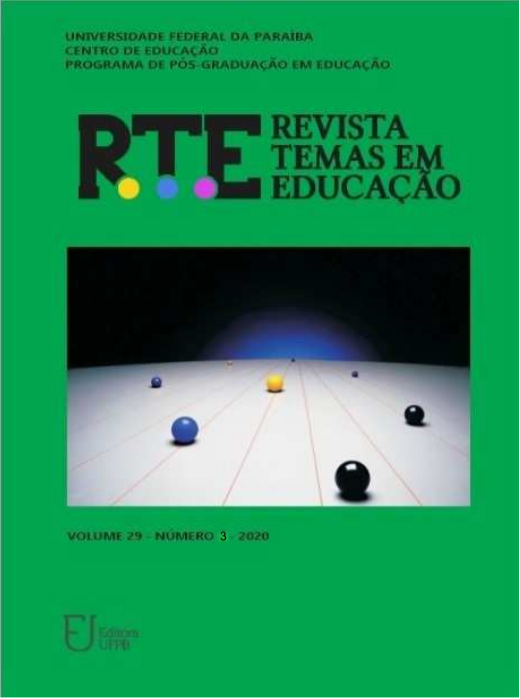CAPITAL PRODUCTIVE RESTRUCTURING AND ITS MATERIALIZATION IN THE BRAZILIAN HIGHER EDUCATIONAL POLICY: FROM THE REFORM OF THE STATE APPARATUS TO THE FUTURE-SE
CAPITAL PRODUCTIVE RESTRUCTURING AND ITS MATERIALIZATION IN THE BRAZILIAN HIGHER EDUCATIONAL POLICY: FROM THE REFORM OF THE STATE APPARATUS TO THE FUTURE-SE
DOI:
https://doi.org/10.22478/ufpb.2359-7003.2020v29n3.53159Keywords:
Productive capital restructuring, Higher education educational policy, Reform of the state apparatusAbstract
This article discusses how the corrosion of capital accumulation bases has motivated a productive restructuring carried out by countless reforms undertaken by the State with a view to making the transition from the bureaucratic management model to the managerial model. In the educational policy of Brazilian higher education, its most evident manifestation is the subsumption of the State's administrative management to business logic, whose decisions are aligned with the market and disregard the right to citizenship as a collective good. That said, it is discussed about which model of education underlies what is guided by these reforms intensified since the 1990s, in Brazil. Currently, the persistence of these adjustments is embodied in propositions such as the Future-se, whose objective is to expand the role of the private sector to fund research and increase the budget of universities and federal higher education institutes. The need to modernize these institutions is alleged, although the objective is, in fact, to change the form of financing, through private funds, as well as to favor university management via Social Organizations. From a methodological point of view, the study uses bibliographic research as a support, in order to clarify how the process of capital productive restructuring globally, from the 1970s onwards, motivated reforms in the Brazilian State and currently materializes in proposals such as that of Future-se, which is nothing more than a new attempt to commercialize higher education.
Downloads
References
BRASIL. Lei de Diretrizes e Bases da Educação Nacional. Brasília: MEC, 1996.
BRASIL. Lei da Organização Social - n. 9.637. Brasília, 1998.
BRITO, R. S.; PRADO, J. R.; NUNES, C. P. As condições de trabalho docente e o pós-estado de bem-estar social. Tempos e Espaços em Educação, v. 10, n. 23, p. 165-174, 2017. Disponível em: https://seer.ufs.br/index.php/revtee/article/view/6676. Acesso em 26 de fevereiro de 2020.
CNTE, Confederação Nacional dos Trabalhadores em Educação. Dossiê Privatização da e na educação: projetos societários em disputa. Retratos da Escola / Escola de Formação da Confederação Nacional dos Trabalhadores em Educação (Esforce) – v.11, n.21, jul./dez. Brasília. 2017. Disponível em: http://retratosdaescola.emnuvens.com.br/rde/issue/view/31/showToc. Acesso em 02 de março de 2020.
FILGUEIRAS, L. Estrutura e conjuntura: a economia política brasileira e o “Future-se”. In: Dossiê Future-se: do governo/MEC e as implicações para a universidade e a sociedade. Agosto, 2019. Disponível em: https://gtfuturese.paginas.ufsc.br/files/2019/08/Dossie%CC%82-FUTURE-SE-ufba.pdf. Acesso em 15 de março de 2020.
FREITAS, L. C. Os reformadores empresariais da educação e a disputa pelo controle do processo pedagógico na escola. Educação e Sociedade. v. 35, número 129, out. - dez. São Paulo: Cortez; Campinas, Cedes, 2014. Disponível em: http://www.scielo.br/scielo.php?pid=S0101-73302014000401085&script=sci_abstract&tlng=pt. Acesso em 28 de fevereiro de 2020.
MANCEBO, D. et al. O trabalho na educação superior. Education Policy Analysis Archives, v. 28, 2020. Disponível em: https://epaa.asu.edu/ojs/article/view/5158. Acesso em 15 de março de 2020.
MARX, K. O Capital, Livro I. São Paulo: Boitempo Editorial, 2013.
MÉSZÁROS, I. Para além do capital. Cap. 1 - A quebra do encanto do “capital permanente universal. São Paulo: Boitempo Editorial, 2011. Disponível em: https://nupese.fe.ufg.br/up/208/o/para-alem-do-capital.pdf?1350933922
PERONI, V.; OLIVEIRA, C. O marco regulatório e as parcerias público-privadas no contexto educacional. Práxis Educacional, v. 15, n. 31, 2019. Disponível em: http://periodicos2.uesb.br/index.php/praxis/article/view/4657. Acesso em 12 de março de 2020.
RODRIGUES, J. Os empresários e a educação superior. Campinas: Autores Associados, 2007.
SANTOS, A. S. A reforma administrativa do Estado brasileiro nos anos 90 e a proposta de descentralização educacional. Práxis educacional. Vitória da Conquista. v. 7, n. 11, p. 53-72, 2011. Disponível em: http://periodicos2.uesb.br/index.php/praxis/article/view/665. Acesso em 04 de março de 2020.
SAVIANI, D. A expansão do ensino superior no Brasil: mudanças e continuidades. Poiesis Pedagógica, v. 8, n. 2, p. 4-17, 2010. Disponível em: https://revistas.ufg.br/poiesis/article/view/14035. Acesso em 10 de março de 2020.
SGUISSARDI, V.; SILVA JR., J. R. Novas faces da educação superior no Brasil: reforma do Estado e mudanças na produção. São Paulo: Cortez; Bragança Paulista: EDUSF, 2001.
Downloads
Published
How to Cite
Issue
Section
License
Authors who publish in this journal agree to the following terms:
. Authors retain the copyright and grant the journal the right to first publication, with the work simultaneously licensed under the Licença Creative Commons Attribution that allows the sharing of the work with acknowledgment of authorship and initial publication in this magazine. . Authors are authorized to assume additional contracts separately, for non-exclusive distribution of the version of the work published in this journal (eg, publishing in institutional repository or as a book chapter), with acknowledgment of authorship and initial publication in this journal.
. Authors are permitted and encouraged to publish and distribute their work online (eg in institutional repositories or on their personal page) at any point before or during the editorial process, as this can generate productive changes, as well as increase impact and citation of the published work (See O Efeito do Acesso Livre).



















